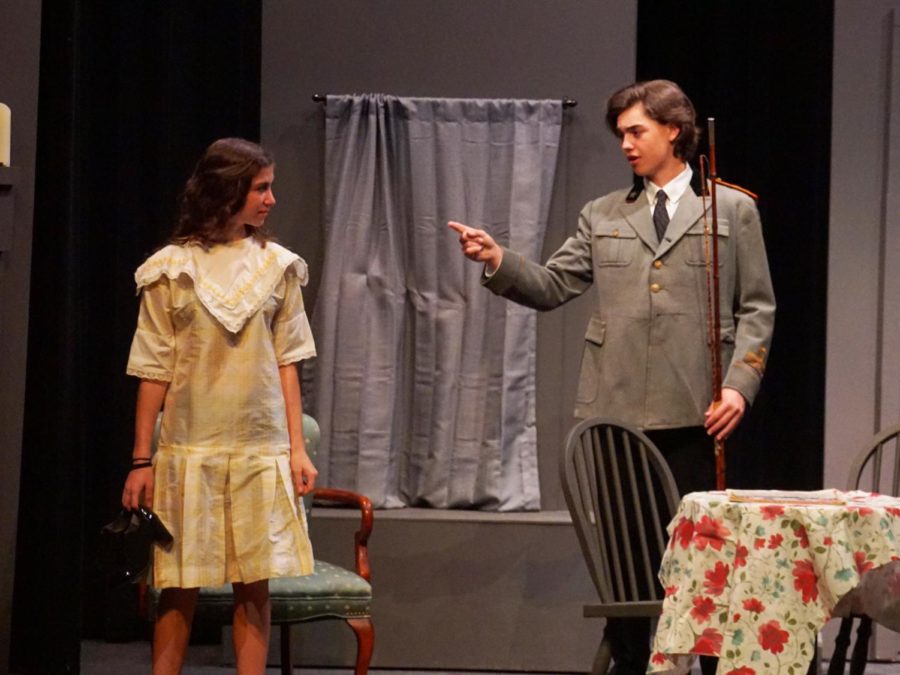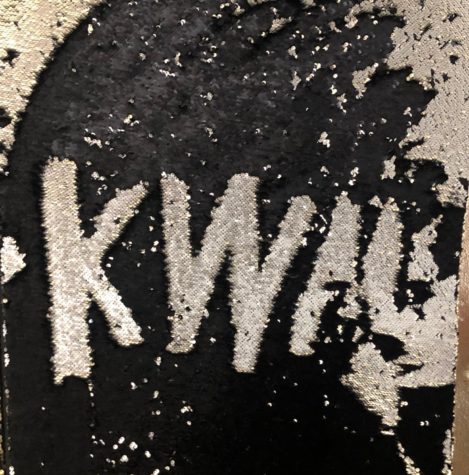Mary Rose: The Apparition
Photo Credit: Br. Raphael
May 20, 2018
It’s late March, the week after Spring Break. After two months of preparation, it’s time for the first full production of Mary Rose. All of our procrastinated efforts have led to this night. Saish Satyal is rehearsing his lines, waiting far too long to actually attempt to learn them. He is finally finding his character now: Mr. Morland, a father dealing with the mysterious loss of his daughter. Close to him, yet somehow still far, is his wife, Mrs. Morland, played by Audrey La, a Junior at Ursuline. When asked to comment on how she felt about being in a Cistercian production, Audrey said, “I feel like the whole cast and crew is a huge family and I’m the mom,” she laughed, “I’m so proud of them!”
I am not a part of these movements. I sit in plain view behind it all with the other narrators, actively viewing the show, waiting for the right time to read our lines. Despite having scripts on hand, narrating proved to be a difficulty for certain people, who occasionally would read the wrong lines or refer to a male character as a “she”. Besides narrating, my hands are often upon one of two synthesizers. These are not mine, but those of our director, Mr. Magill, the director of the Cistercian school play. His changes to the play and implementation of interesting staging techniques made the show very dynamic and engaging.
It is only four hours later that its showtime. We eat before- hand, and then run backstage, walking around in the dark trying to set our props in their proper places. Everybody is terrified. We convene one last time in the biology lab, going over our final set of notes. Mr. Magill leads us through, detailing everything from my slow speaking to the deliveries from the lead roles. The conference quickly ends, and we begin to stretch for the last time before the great test. It’s beginning to dawn on the cast how unprepared we feel. Cistercian drama veterans Audrey La, Sebas- tian Currlin, and Evan Bird help us to warm up and stop stressing. We sharpen our tongues, reciting the location of a lake in Peru, a town in Hawaii, and other miscellaneous and intriguing items, and then sprint down the stairs to go perform…
It went so well! The lines we forgot during our rushed rehearsals finally decided to stick around, for the most part (a few spare things about fields, ghosts, and the Ministry had other intentions). The cues were seamless, with the colored lights finally shining in their full glory, and surprisingly not causing the light board to explode for the second time in a week. The music also landed perfectly, with Alex Banul’s beautiful cello cover of Jeff Buckley’s “Hallelujah” closing out the show as our lead actress, Mary Schommer, disappeared into the night sky.
The success of this show was surprising on many levels. Patrick Geary, in particular, loved “the amount of room we had to change the set and the dialogue. Since we owned the rights to this play, we didn’t have to go exactly by the script.” But he was not a fan of how we had “so little time and so much to learn,” and that we only had time that to “make it good, not perfect.” But despite these setbacks, from the explosive light board to literally not performing the show in its entirety until our first performance in front of an audience, the fact that the show was even coherent was a miracle. We all were screaming out in the victory. Everyone, from my fellow narrators to the cast and crew, was in on the excitement. The cries ranged from “We did it!” to “That wasn’t awful!” Everyone went crazy. All in all, it was a stunning underdog victory that I’ll never forget.

